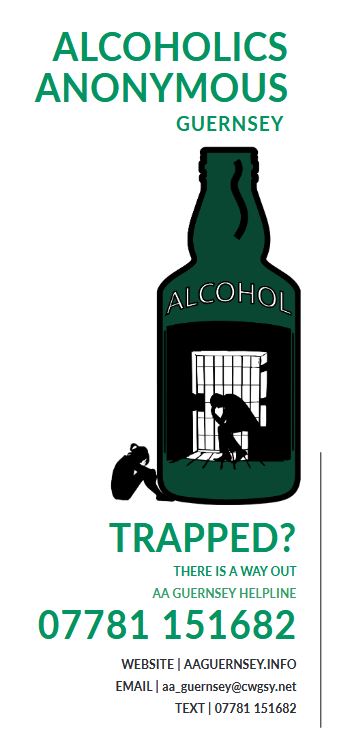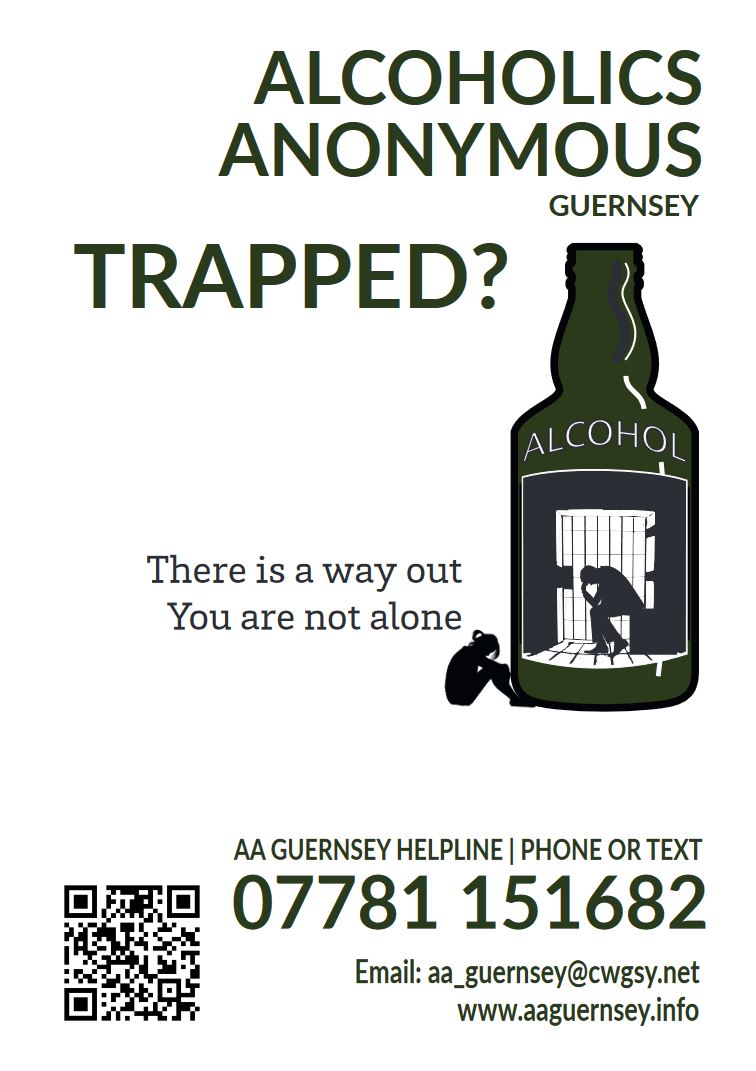Alcoholics Anonymous as a Resource for Professionals
Information for medical and other professionals
Alcoholics Anonymous offers the suffering alcoholic help in attaining and maintaining sobriety. The success rate is high, and the AA 12 step programme of recovery is used by leading treatment centres. The fellowship of AA is well established in Guernsey, with daily meetings. The current emphasis in the UK on the promotion of abstinence and recovery rather than harm reduction is seen to be effective. This accords with AA’s experience which shows that, for the true alcoholic, there is no such thing as controlled drinking: the only solution is abstinence. AA is cost free both to the individual and to the community. AA in Guernsey seeks more effective cooperation with the treatment services, and wishes to encourage referral from health professionals and others in a position to advise the suffering alcoholic.
About AA
Alcoholics Anonymous is a voluntary, worldwide fellowship of men and women from all walks of life who meet together to attain and maintain sobriety. The only requirement for membership is a desire to stop drinking. There are no dues or fees for AA membership.
AA in Guernsey
AA has a thriving fellowship in Guernsey, with meetings every day—two meetings most days.
Many hundreds of Islanders have benefited from attendance at local AA meetings, helping them to stay sober and rebuild lives previously damaged or threatened by alcoholism. Full participation provides the key to contentment and a new freedom.
AA is about one alcoholic talking to another; there are no professional counsellors. Sobriety of Guernsey AA members ranges from one day to more than thirty years. Newcomers will benefit from sharing experience, strength and hope with others with the same problem.
A warm welcome awaits newcomers and visitors to Guernsey meetings.
How AA views alcoholism
AA members view alcoholism as a progressive illness with a combination of spiritual, emotional (or mental) and physical components. We see our problem as being a physical addiction to, and a mental obsession with, alcohol. The alcoholics we know have lost the power to control their drinking.
AA works!
The rate of growth of AA shows that an increasing number of alcoholics are recovering from this disease. There are some 97,000 AA groups in more than 150 countries with a worldwide membership of more than 2,000,000. Women constitute half of the Fellowship and young people (30 years and under) about 11 per cent.
AA members sober more than a year have a very high likelihood of continuing their successful process of recovery.
Our experience is available free
AA in Guernsey has operated continuously since 1961, and is part of the wider Fellowship of AA in Great Britain, with its experience involving tens of thousands of alcoholics.
This mass of intensive firsthand experience with all kinds of problem drinkers in all phases of active alcoholism and recovery is available free.
Cooperation with others
Many members have come to AA as a consequence of contact with a well-informed non-alcoholic. We seek to cooperate with members of the medical profession and others in our attempts to reach those with our problem. Obviously it is not true that only an alcoholic can help an alcoholic. Our individual histories clearly show us that non-alcoholics do many things for alcoholics that AA does not do.
Some people come to AA with more problems than alcoholism. AA does not claim to have the skills or knowledge to deal with these problems, but would always advise the individual concerned to seek professional help, while continuing to attend AA for his or her alcoholism.
The alcoholic’s resistance to help can be frustrating
In our experience, denial of the problem is symptomatic of alcoholism—it is the one illness that tells you that you haven’t got it! Alcoholic patients tend to be evasive when questioned about their drinking. Patients may resist any suggestion that alcoholism is involved, and may be equally resistant to AA as a solution.
Doctors have rarely had their diagnosis rejected by the patient. They would not expect to be told, “I certainly am not a diabetic.” Yet when the doctor makes a diagnosis of alcoholism, an alcoholic may respond, “I don’t drink that much,” or will offer excuses for his or her drinking. Doctors can expect and anticipate this.
Rationalisation and denial are part of the alcoholic’s illness. Initial rejection of AA is part of the denial mechanism. AA members, having broken through their own denial and faced the harm in their drinking, are particularly suited to helping others break through their denial.
AAs maintain recovery by helping others
The subjective experience of alcoholism is something only an alcoholic can share with another alcoholic. This is why our service is totally confidential and our membership remains anonymous. Traditionally, this reminds us always to place principles before personalities.
Members of AA have found that trying to help other alcoholics in their unique but often effective way is good for them, whether or not the alcoholic they are trying to help chooses to use what is on offer. AA groups attempt to concentrate on an informal person-to-person approach with anyone for whom alcohol is causing problems.
AA’s structure is different from other agencies
The organisational structure of AA is quite different from other agencies. Members themselves, without payment, perform all the services voluntarily. There are no rules, no regulations, and no official procedures or official governing authority. Instead, AA is a fellowship of peers, relying on tradition, suggestion and example.
The local group
The principal operating unit of AA is the local group. Each group is autonomous, with leadership roles being rotated. Members accept responsibility for jobs that need to be carried out to make the meetings friendly and run as smoothly as possible. Each AA group is a self-supporting entity.
AA is self-financing
AA’s only income is derived from members making voluntary contributions and by small profits made from the sale of AA publications. The income meets the costs of running meetings, operating a telephone helpline, and maintaining a small national service office.
AA does not accept contributions from any outside sources.
AA 'open' meetings
Going to AA open meetings is the best way to get a feel for the form and dynamics of AA.
Two meetings each week in Guernsey are designated 'open' and may be attended by non-alcoholics. Typically these would be family members or supportive friends. Particularly welcome are healthcare professionals wishing to see AA in action.
An eminent psychiatrist has written:
Recovering alcoholics, who are prepared to talk freely and to answer questions put to them relating to their own past experiences, provide vivid demonstration of the fact that many alcoholics can recover. Such discussions with recovering alcoholics seem very often to provide an eye opener, a lesson which the professional participant is not likely to forget in a hurry, and which thereby may prove very helpful to him and even more so to the alcoholic patients he may meet in the future.
Welcoming newcomers to AA
A newcomer’s route to AA may be through self-referral (by calling the AA helpline), through attendance at a treatment centre, or by recommendation of doctors, psychiatrists, or of other agencies.
Attending a first meeting with an existing member is desirable, although not a must. New enquirers are often daunted by the prospect of attending a meeting. To help allay their fears, newcomers are offered the opportunity of a home visit (or a visit on neutral territory if preferred), with two members attending, at least one of whom is the same sex as the newcomer. Most newcomers have many questions. Members can answer these and reassure the newcomer that others have experienced the same reluctance and fear in taking a first step towards recovery.
Sharing experience as peers is the unique service AA offers.
Cost-effectiveness of AA
As a resource to the community, AA is completely free. To the member, there are no fees, although members will wish to make small voluntary contributions towards the costs of running meetings.
Many members attain and maintain their recovery solely through AA. Others have ongoing medical and psychiatric treatment needs. For these, studies have shown that treatment costs are almost halved where patients are also engaged with AA. It follows that referral of patients to AA can increase substantially the capacity of the healthcare treatment services.
How effective is AA? Who recovers?
It is well understood that there is no typical alcoholic. We are from all walks of life, rich and poor, women as well as men, and of all ages. Predicting who will achieve good recovery from alcoholism is an uncertain matter. However, a substantial majority of alcoholics who engage fully with AA do achieve recovery.
- Everyone CAN recover
- Not everyone WILL recover
- We don’t know WHO will recover
- So, give everyone EVERY CHANCE
Objections to AA—the "religion" myth
AA is not allied with any religious group, formal or otherwise, nor does it tell its members what to believe, what is right or wrong, or claim to know any religious "truth".
The 12 Steps of recovery suggest belief in a "Higher Power", something more than the individual. It replaces the power alcohol had on their lives. The form that this Higher Power takes is entirely up to the individual concerned. Some members have religious beliefs. Others do not. Members find the AA programme works whether they are agnostic or atheist.
Other objections
A survey enquiring into reasons why AA was not promoted more actively in the UK National Health Service found the following:
- "Our clients don’t like it, they won't go…"
- "12 step is not for everyone…"
- "They’re just swapping one addiction for another…"
- "If they go there they won’t need me…"
This last would appear to be more endorsement than objection!
How AA fits into the Guernsey States Drug and Alcohol Strategy
Within the context of the Drug and Alcohol Strategy, AA in Guernsey would wish to be seen as a resource for the medical profession and for the treatment agencies. It should not, however, be itself regarded as one of the agencies. It would not, for example, participate in a shared care plan, nor divulge member attendances.
Fundamental to AA is the anonymity of its members. No membership or attendance records are kept. Treatment agencies referring patients to AA would, when needed, continue to monitor progress by direct patient contact.
Referral to AA
While AA necessarily maintains the confidentiality of members, it seeks to cooperate fully with others to facilitate the referral of sufferers. AA maintains contact through volunteer members elected to liaison roles with Health, the Prison, Probation, Police, Employers, treatment agencies, the Samaritans, and other charities. A Public Information team has members available to talk to interested outside groups.
The AA helpline is manned throughout the day and evening and is the normal referral channel. Most effective are the calls made by the sufferer while in the doctor’s surgery or while receiving advice from an agency.
There is no referral time for Alcoholics Anonymous. A first step can be a call to the helpline, enabling a client to attend an AA meeting on the same day.
Literature
Much of the content of this article is taken from the AA publications, AA as a Resource for the Medical Profession and AA as a Resource for Employers, copies of which are available on request.


